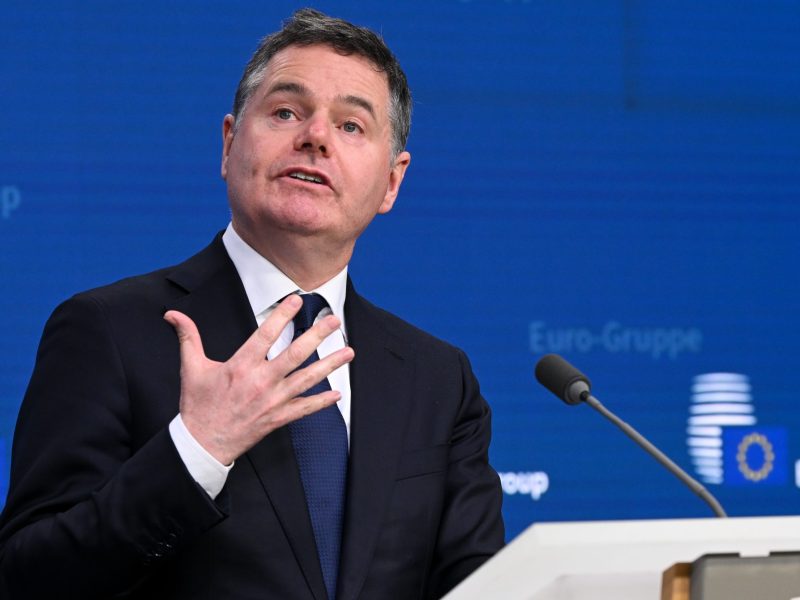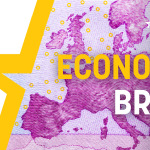
The European Central Bank’s (ECB) decision to keep interest rates at their record high levels on Thursday (26 January) has raised fears about its impact on Germany, as it shows increasing signs of weakness amid a manufacturing slump and declining business confidence.
The ECB raised rates on ten consecutive occasions between July 2022 and September 2023 after Russia’s invasion of Ukraine sent prices soaring across Europe, bringing its benchmark deposit facility rate from -0.5% to 4.0%. Easing price pressures caused the bank to pause rate hikes at its two previous meetings in October and December.
The bank’s decision also came the day after the ifo Institute, a Munich-based think tank, downgraded its 2024 GDP forecasts for Germany, the eurozone’s largest economy, from 0.9% to 0.7%. Last week, the country’s own Federal Statistics Office reported that the German economy had shrunk by 0.3% last year.
Rasmus Andresen (Greens/EFA), a German member of the European Parliament’s Economic and Monetary Affairs Committee and the rapporteur for the Parliament’s annual report on the ECB in 2022, condemned the ECB’s decision as “very damaging” despite the fact that it was widely anticipated.
“We all know that if the German economy is sick, then Europe’s economy is sick because Germany has quite a dominant economic role in Europe,” Andresen told Euractiv.
“I think that [the decision is mistaken] especially at a time when Europe’s largest economy is in a recession, and also at a time when we need to see much more investments, both private and public, to transform our economy into a more green future,” he added.
According to the latest figures released by Eurostat, the EU’s official statistics office, year-on-year inflation in December was 2.9%: up from November’s rate of 2.4% but well below the peak rate of 10.6% reached in October 2022. The ECB’s target rate is 2%.
‘Looking pretty bad’
Andresen’s comments were echoed by Sander Tordoir, a senior economist at the Centre for European Reform, who told Euractiv that “most of the data suggests that the ECB should cut aggressively and rather soon”, although he didn’t expect the ECB to actually cut rates “until April or June”.
Tordoir also pointed to studies – including by the ECB itself – which suggest that inflation in the eurozone, unlike in the US, is largely supply- instead of demand-driven.
“The eurozone has essentially been unlucky and has been hit very heavily by not only the pandemic supply shock, but also the supply shocks from Russia’s invasion of Ukraine,” he said.
“And the weakness in Europe is very much in France and Germany. So it’s at the heart of the eurozone economy. Germany has been weaker for longer. The latest round of soft economic indicators in France are looking pretty bad as well,” he added.
‘A necessary sacrifice’
However, Philipp Lausberg, an analyst at the European Policy Centre (EPC), stressed that ECB’s primary mandate is to keep inflation at 2%, and that the ECB likely regards the German economy’s poor performance as a “necessary sacrifice” for this to happen.
He also pointed out that Germany itself was one of the EU countries that was originally in favour of having an inflation-focused eurozone central bank.
“The Germans are the ones who are most behind this concept of an independent central bank,” he said. “It has been founded on the model of the Bundesbank, which has used this policy quite successfully in the post-war period.”
“Of course, there have always been member states that would have liked to see a much more politically active ECB that is more active in growth and job creation. But this is not what this institution’s DNA is like. I wouldn’t expect it to do that.”
The ECB’s decision also came despite growing pressure from European workers for the bank to cut rates as soon as possible.
Earlier this week, Esther Lynch, the General Secretary of the European Trade Union Confederation (ETUC), which represents 45 million workers across Europe, told Euractiv that the ECB’s tight policy was “piling unnecessary financial pressure on working people” and “risked pushing the economy into a job-destroying recession”.
Fears of a possible recession were further validated on Friday (26 January), when the ifo Institute reported that German export expectations fell in January, including in core manufacturing industries such as automakers and makers of machinery, equipment, and electrical equipment.
[Edited by Nathalie Weatherald]










